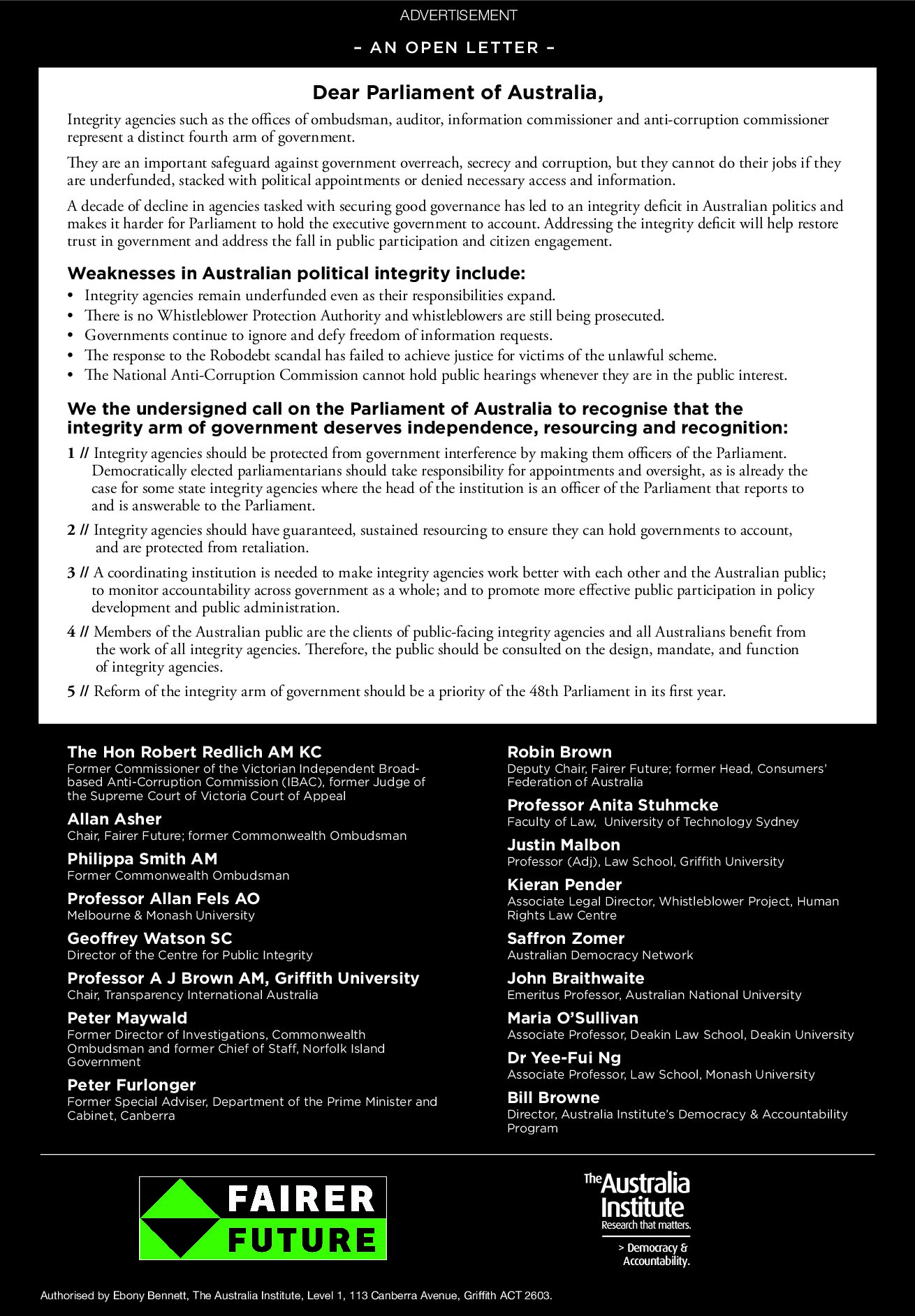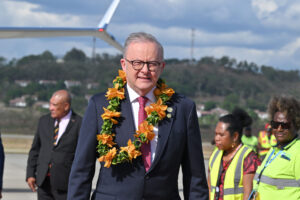“An Albanese Labor government will restore Australia’s climate leadership, and listen and act on Pacific island warnings of the existential threat of climate change.”
Despite a clear election campaign commitment to listen to Pacific Island nations and act on climate change, the Australian government continues to enable and encourage new and expanded fossil fuel projects.
When it comes to climate change, Australia’s actions matter. Accelerated by Australia’s continued supply of fossil fuels, climate change poses a serious, direct and immediate threat to human and environmental security.
In the Pacific and the Torres Strait, rising sea levels caused by climate change threaten to inundate entire islands.
Australia has a long and shared history with Pacific island countries and has co-signed legally binding international treaties and agreements, such as the Paris Agreement and the Boe Declaration, pledging action on climate change.
The Labor Party’s election campaign in 2022 boasted climate commitments and intentions to restore Australia’s relationships and reputation with our Pacific “brothers and sisters”.

Just four days into her new role as Foreign Minister Penny Wong spoke to the Pacific Islands Forum Secretariat in Fiji: “Whether it manifests in rising sea levels in Pacific Island countries, or in disastrous bushfires and catastrophic flooding back at home in Australia, we can see that climate change is happening across the Pacific family. I want to assure you that we have heard you.”
But it is difficult to see how the Albanese Labor Government has succeeded in restoring Australia’s climate leadership, or how it has listened to or acted on Pacific climate priorities. In its first term, the Albanese government has announced the Future Gas Strategy, which locks Australia in for new gas to 2050 and beyond, and has approved seven new coal mines.
In 2024, the Australian government provided $11.1 billion in fossil fuel subsidies.
Just this week, Australia argued in the International Court of Justice against developing international laws to oblige countries to act on climate change – directly undermining submissions and advocacy from Pacific Island nations.
Australia’s failure to adequately respond to climate concerns is not new or limited to Pacific Island nations.
Australia has also failed to address domestic climate concerns.

At the 2024 Climate Integrity Summit, Torres Strait Island elder Dr Aunty McRose Elu, argued: “Australia’s response to climate change is one of the weakest in the world. Our leaders say they care, but they ignore the scientific evidence and do things that will ensure our communities will go under the water. We are running out of time.”
In 2022, the United Nations Human Rights Committee found that Australia violated Torres Strait Islanders’ rights by failing to protect them from climate change. Attorney-General Mark Dreyfus committed to consider and respond to the UNHRC report “in due course” – as of December 2024, there has been no formal response.
For decades, Pacific Island and Torres Strait Island leaders have articulated their key priorities for climate action with clarity. The previous government’s 2022 Strengthening Australia’s relationships in the Pacific Inquiry acknowledged Pacific Island nations’ deep concern about climate change, and recommended that support for climate change mitigation and adaptation should be a high priority in Australia’s immediate regional assistance program.
Despite clear messages from the Pacific, in 2024, Australia has chosen to conduct another long and resource intensive inquiry into Australia’s response to the priorities of Pacific Island countries and the Pacific region, rather than engage in genuine climate action.
A history of Pacific climate advocacy
Pacific leaders and civil society organisations have consistently advocated for Australia to uphold and fulfil its commitments to listen to and act on warnings of the existential threat of climate change.
The Paris Agreement,
- a legally binding international treaty on climate change that was adopted at COP21 in Paris in 2015. The Alliance of Small Island States, which includes Pacific Island nations, led negotiations to include the long-term temperature goal of 1.5 degrees in the Paris Agreement, in line with safe limits for the Pacific.
The Boe Declaration,
- adopted by the Pacific Islands Forum and Australia in 2018, is a regional security agreement that acknowledges that “climate change remains the single greatest threat to the livelihoods, security and wellbeing of the peoples of the Pacific”.
The Loss and Damage Fund,
- was established at COP28 in 2023, following decades of Pacific advocacy, to compensate developing states for the climate harms caused by wealthy countries and help them respond to climate impacts. Pacific Island leaders and civil society organisations have called for a significant increase in contributions to the loss and damage fund. At COP29 in Azerbaijan, the Australian government committed just $50 million to the fund – less than 1 per cent of what it allocates to fossil fuel subsidies.
Pacific leaders have advocated for Australia to commit to:
The Port Vila Call for a Just Transition to a Fossil Fuel Free Pacific
The Call was issued by the governments of Vanuatu, Tuvalu, Tonga, Fiji, Niue and Solomon Islands following a Pacific Islands Forum Economic Ministers Meeting in Suva in 2023.
The Port Vila Call proposes:
- A fossil fuel-free Pacific and a global, just and equitable phase-out of coal, oil and gas;
- New Pacific-tailored development pathways based on 100 per cent renewable energy;
- Expanded public and private finance for the just transition from fossil fuels to renewable energy;
- Redoubled efforts to reaffirm, strengthen and codify legal obligations with respect to the global phase-out of fossil fuels.
The Fossil Fuel Non-Proliferation Treaty
The treaty was established in 2019 and aims to “accelerate a transition to renewable energy for everyone, end the expansion of coal, oil and gas, and equitably phase out existing production in keeping with what science shows is needed to address the climate crisis”.
The treaty has been signed by Vanuatu, Tuvalu, Fiji, Solomon Islands, Tonga, Niue, Timor-Leste, Antigua and Barbuda, Palau, Colombia, Samoa, Nauru and the Republic of Marshall Islands, and is endorsed by the World Health Organisation and the European Parliament.
Despite clear and consistent calls from Pacific neighbours and allies, Australia is showing no signs of a climate course correction.
- Australia’s emissions are increasing.
- Seven new coal mines have been approved since the 2022 election.
- The Future Gas Strategy locks Australia in for new gas until 2050.
- The Australian government has contributed just $50 million to the Loss and Damage Fund.
- In contrast, the 2024 federal budget included over 200 times more in fossil fuel subsidies – $11.1 billion.
- Australia is yet to respond to the UNHRC finding that Australia violated Torres Strait Islanders’ rights by failing to protect them from climate change.
- Australia has signed the Falepili Union, a security pact which in recognition of “the importance of collective sovereignty, whereby a country’s actions can impact on its neighbours”, will assist people from Tuvalu to migrate to Australia because “we believe the people of Tuvalu deserve the choice to live, study and work elsewhere, as climate change impacts worsen”. Enele Sopoaga, former prime minister of Tuvalu, said at the Australia Institute’s 2024 Climate Integrity Summit that he has “never seen anything so brazen, so disrespectful, as this agreement”.
- In December 2024, Australia argued in the International Court of Justice against developing international laws to oblige countries to act on climate change.

For the Australian government, the climate crisis is also a crisis of integrity. As His Excellency Anote Tong, former president of Kiribati said at the Climate Integrity Summit 2024, “I know we get development assistance to build our climate resilience. Isn’t it funny that we are getting that assistance but at the same time, you’re [Australia is] doing the very thing that is destroying our homes.”
Between the Lines Newsletter
The biggest stories and the best analysis from the team at the Australia Institute, delivered to your inbox every fortnight.
You might also like
Open letter calls on newly elected Parliament to introduce Whistleblower Protection Authority, sustained funding for integrity agencies to protect from government pressure.
Integrity experts, including former judges, ombudsmen and leading academics, have signed an open letter, coordinated by The Australia Institute and Fairer Future and published today in The Canberra Times, calling on the newly elected Parliament of Australia to address weaknesses in Australian political integrity. The open letter warns that a decade of decline in agencies
Unfinished Business: Towards a settlement on Aboriginal land rights in the ACT
The Australia Institute has today published a discussion paper on the barriers to progress on Aboriginal land rights in the ACT. The paper explores the issues that need to be resolved before the ACT Government can make progress on treaty discussions. Key Findings: The transfer of the land of the ACT from NSW to the
Pacific nations have just delivered Australia two smackdowns. That’s a big deal.
We need to talk about the Pacific.



